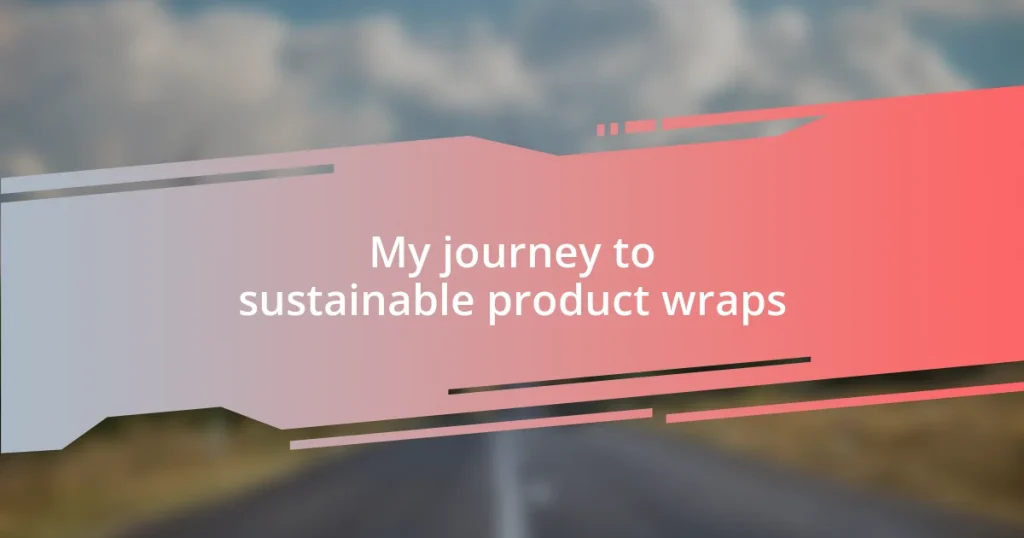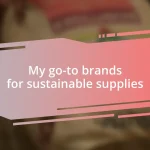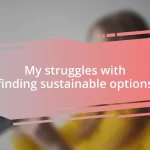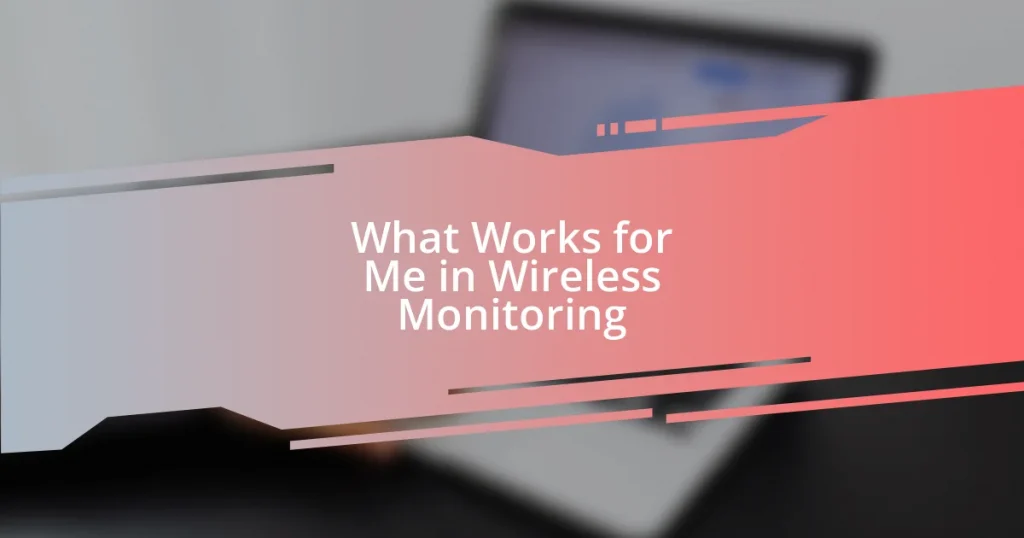Key takeaways:
- Sustainable product wraps, such as biodegradable materials and beeswax wraps, significantly reduce environmental impact and promote a more ethical approach to packaging.
- Innovative materials like mushroom mycelium and recycled fabrics highlight the importance of creativity and technology in developing sustainable packaging solutions.
- Supporting eco-conscious brands fosters a sense of community and purpose, emphasizing the emotional connection consumers can develop with sustainable products.
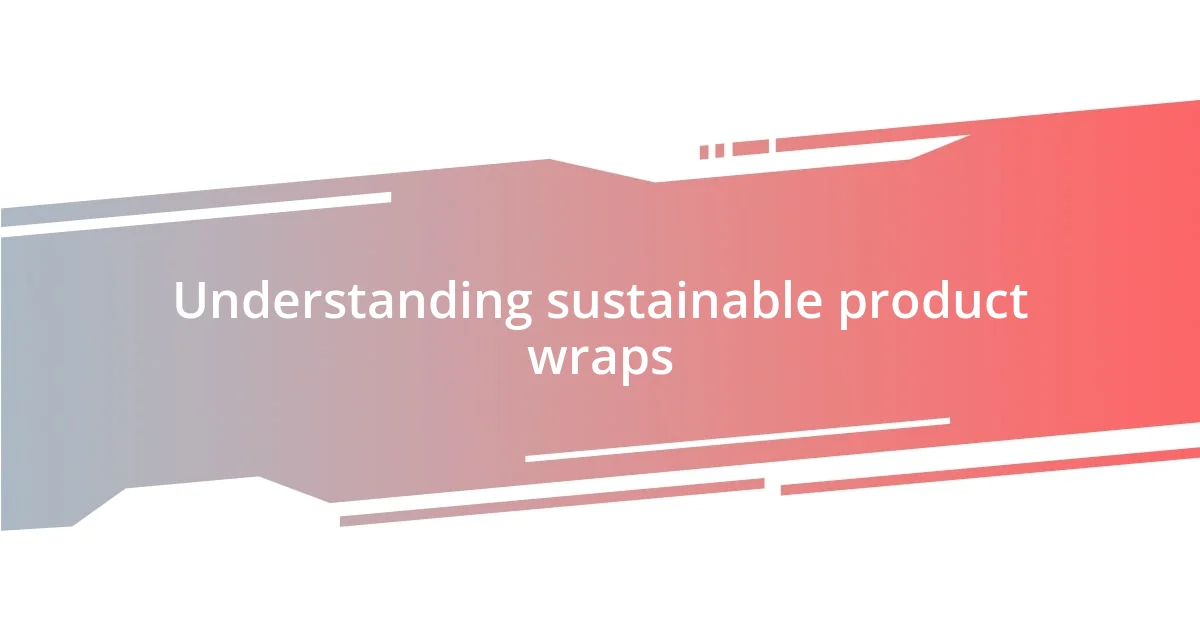
Understanding sustainable product wraps
Sustainable product wraps are designed to minimize environmental impact while providing essential functionality. I remember the first time I received a package wrapped in biodegradable material; it felt almost surreal. It made me wonder, why had we settled for plastic for so long when these alternatives exist?
When we think of wraps, we immediately picture the shiny plastic films or bubble wraps that seem to dominate the market. However, as I delved deeper into sustainable options, I discovered materials like beeswax wraps and compostable paper that not only serve the purpose of protection but also contribute positively to our planet. Isn’t it heartening to think that something as simple as the way we package our goods can lead to a more sustainable future?
Many people overlook the importance of sourcing materials for wraps; transparency in production processes can greatly influence sustainability. I often find myself questioning brands: Are they using eco-friendly resources? What’s their carbon footprint? Engaging with companies on these topics often leads to revealing their commitment to sustainability, and it can be quite inspiring to see how some brands genuinely prioritize ethical practices over profit.
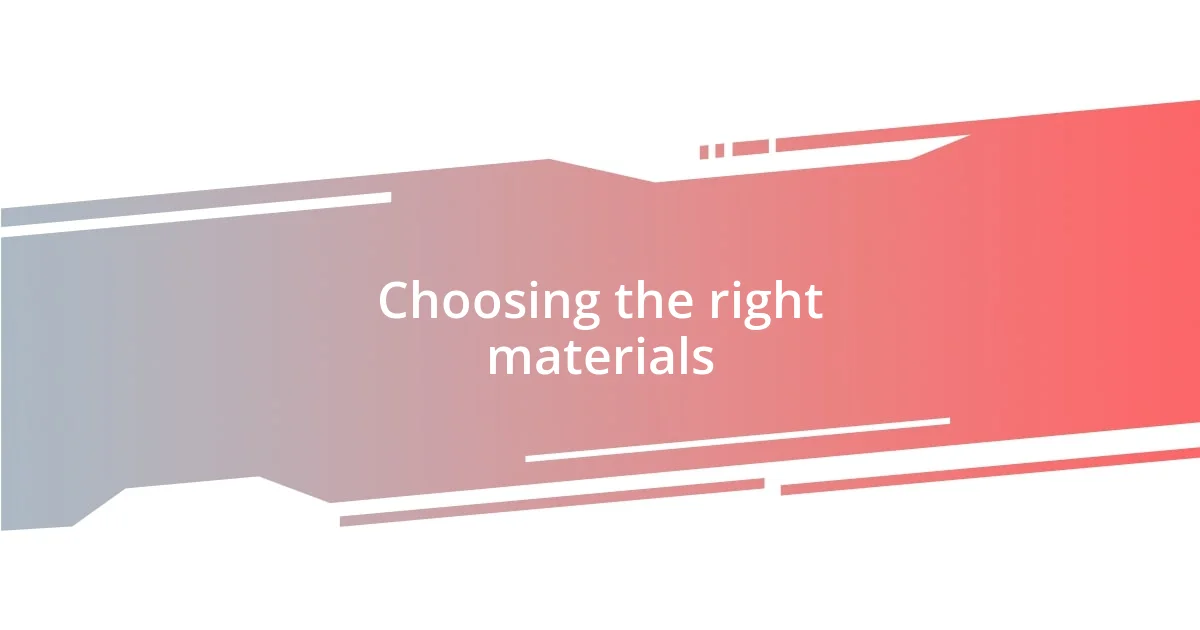
Choosing the right materials
Choosing the right materials for sustainable product wraps is crucial. I distinctly remember my first encounter with compostable paper wraps. The texture was different, almost warm compared to plastic. This small detail made me appreciate that sustainability can also evoke a tactile experience—the feeling that I was using a product that was considerate of the planet.
When selecting materials, it’s essential to consider their biodegradability and lifespan. For instance, while beeswax wraps may not decompose as quickly as some paper options, they can be reused multiple times. This real-world experience has shown me that durability can also play a role in sustainability. It’s all a balancing act; sometimes, materials that seem less eco-friendly can be more sustainable in practice due to their longevity.
I also encourage exploring innovative materials like mushroom mycelium or recycled fabrics. These alternatives caught my eye when I attended a sustainability expo last year. Seeing these materials in action made me realize that the future of product wraps is not just about what’s “green” but also about creativity and technology blending together. Isn’t it refreshing to think about how our choices can drive innovation and protect the environment simultaneously?
| Material | Properties |
|---|---|
| Beeswax Wraps | Reusable, biodegradable, breathable |
| Compostable Paper | Biodegradable, eco-friendly, limited reuse |
| Mushroom Mycelium | Biodegradable, innovative, versatile |
| Recycled Fabrics | Durable, reduces waste, can be repurposed |
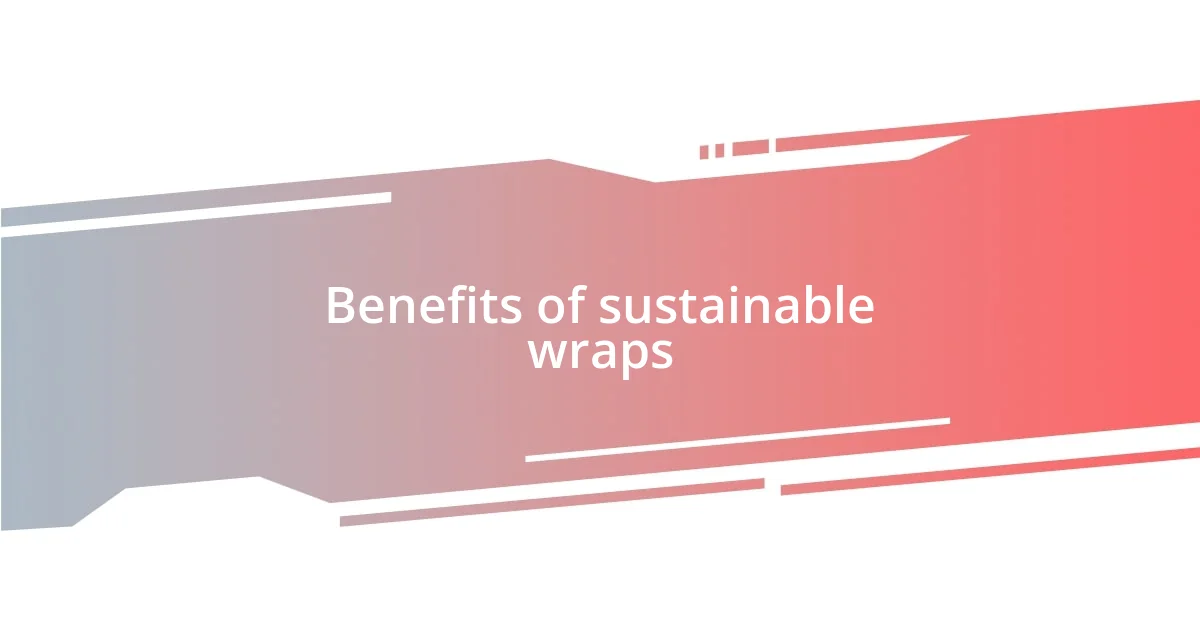
Benefits of sustainable wraps
Sustainable wraps offer a plethora of benefits that go beyond just protecting the products inside them. I recall unpacking a gift wrapped in compostable paper—it brought me such joy knowing that even the wrapping had a minimal impact on the planet. This emotional connection made me realize that choosing sustainable options can also evoke a sense of purpose, making consumers feel empowered about their choices.
Here are some key benefits of sustainable wraps:
- Environmental Impact: They significantly reduce plastic waste, which is a crucial step toward combating pollution.
- Biodegradability: Many sustainable wraps decompose into natural materials, enriching the soil rather than sitting in a landfill.
- Healthier Alternatives: Materials like beeswax wraps are free from harmful chemicals often found in traditional plastic wraps.
- Reusability: Some options, like my favorite beeswax wraps, can be washed and reused, prolonging their life cycle and reducing waste.
- Innovation and Creativity: The growing demand for sustainable wraps inspires innovative designs and materials, like mushroom mycelium, that challenge the status quo.
Thinking back to my experiences, I always felt a sense of pride when sharing wrapped gifts with family and friends, knowing I was supporting a sustainable lifestyle. Every time I opt for these wraps, I feel like I’m contributing to a larger movement toward environmental consciousness, which is incredibly rewarding.
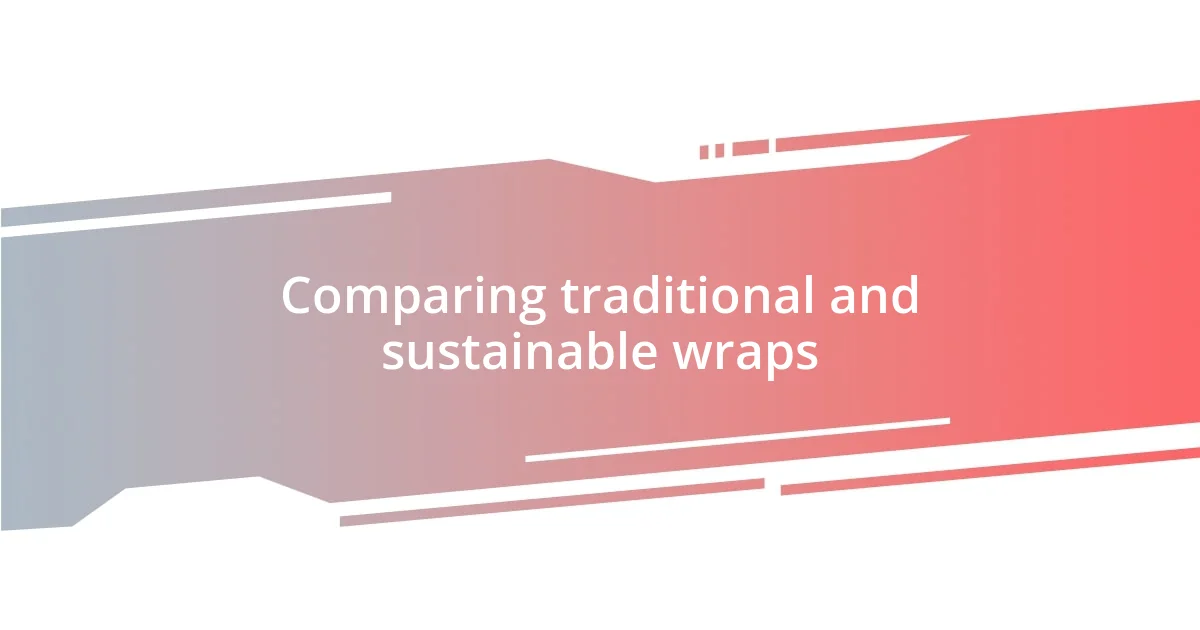
Comparing traditional and sustainable wraps
Traditional wraps, like plastic, often leave me feeling a bit uneasy. I remember the frustration of wrapping a beautiful gift only to think about how that wrap would end up in a landfill, taking years to break down. It’s disheartening to realize that a moment of joy could lead to long-lasting environmental harm. Why should a quick convenience come at such a high cost?
On the other hand, I’ve found sustainable wraps to be a refreshing alternative. The last birthday gift I wrapped in a plant-based film felt like a small victory. As I tied the package with eco-friendly twine, I felt a connection—not just to the recipient, but to the broader mission of reducing waste. It’s amazing how something as simple as wrapping can empower me to make more mindful choices.
While traditional wraps often lack creativity, sustainable options encourage me to get crafty. I’ve enjoyed experimenting with cute patterns on DIY fabric wraps, turning what used to be a mundane task into a fun, artistic expression. Isn’t it delightful to consider that something as practical as a wrap can also be a canvas for personal creativity?
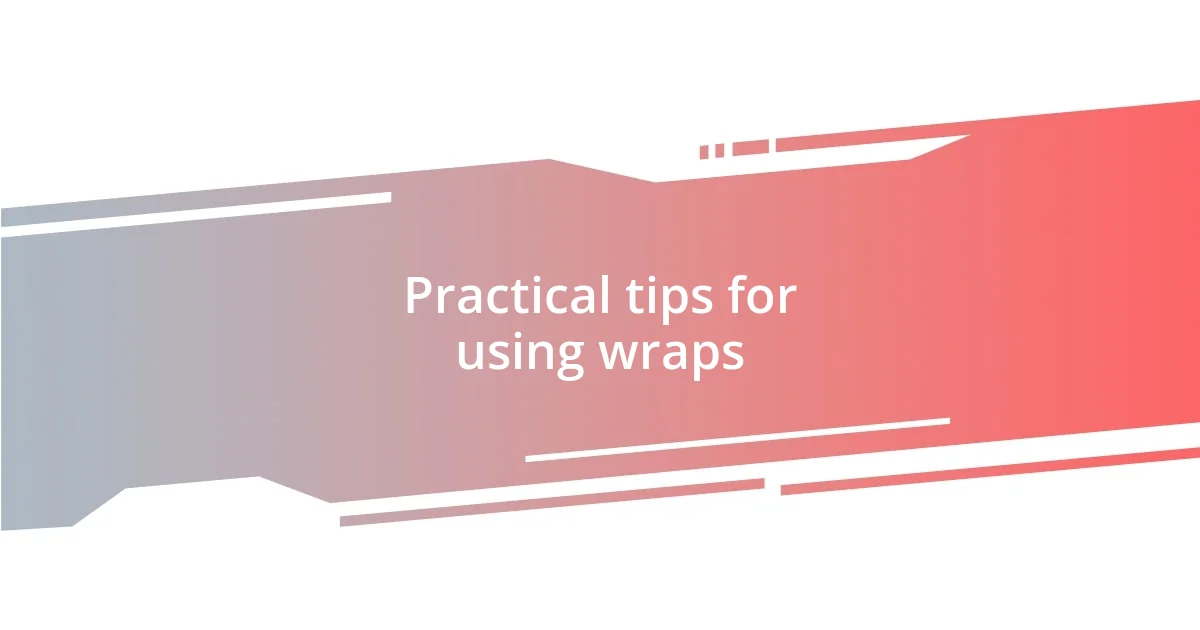
Practical tips for using wraps
When using sustainable wraps, it’s essential to handle them with care. I remember the first time I washed my beeswax wraps; I was hesitant, fearing they might lose their charm. To my delight, they recovered beautifully, ready for another round of gift-giving. Just like that, learning to treat wraps gently extends their lifecycle and reinforces my commitment to sustainability.
Another practical tip is to be mindful of sizing. I often find myself frustrated when a wrap is either too small or too large for what I’m covering. By taking a moment to measure, I ensure the wrap not only fits snugly but also reduces waste. Plus, it’s a perfect excuse to get creative—perhaps layering smaller wraps to create a unique, eye-catching design!
Don’t shy away from incorporating natural embellishments, either. For instance, I love using dried flowers or leaves to decorate my wrapped gifts. It’s remarkable how a simple addition can transform a standard wrap into something extraordinary. Plus, it’s a fantastic conversation starter! Who wouldn’t love to discuss the thoughtful touch of nature that enhances a gift’s presentation?
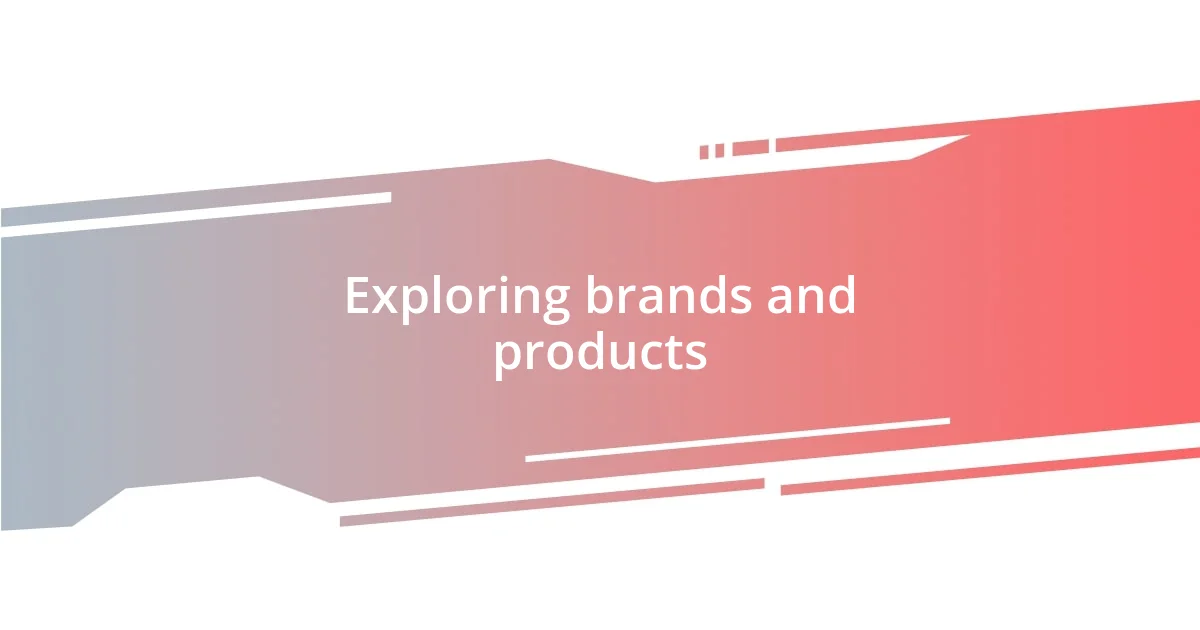
Exploring brands and products
As I began my journey into sustainable wraps, I found myself curious about the brands leading the charge in eco-conscious packaging. I stumbled upon one brand that specializes in compostable wraps, which truly piqued my interest. The moment I received my first order, I could feel the care they poured into their product—from the vibrant colors to the earthy smells—reminding me that sustainability can and should be a joyous experience.
Exploring these brands also meant delving into the stories behind their products. I remember reading about a small company that started in a garage, fueled by a passion for reducing plastic waste. Their dedication was evident in every aspect—packaging, materials, and ethical sourcing. Isn’t it inspiring to support businesses that care deeply about the environment while also enriching local communities?
Every product I’ve tried has been an incredible opportunity to reflect on my values. Recently, I experimented with reusable fabric wraps from a brand committed to fair trade. Wrapping a gift in one of their colorful creations, I felt not just the joy of giving but also a connection to a larger purpose. How would it feel to know that my choice helps artisans around the world while contributing to a healthier planet? It’s a transformative feeling that makes each gift even more special.










